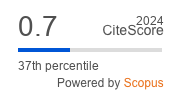Antinociceptive Effect of Silymarin in Experimental Animals
Keywords:
Silymarin,, milk thistle,, painAbstract
Background: Silymarin is a polyphenolic flavonoid
derived from milk thistle (Silybum marianum) that has
anti-inflammatory, cytoprotective, anticarcinogenic
and antioxidant effects. It has been used medicinally
to treat liver disorders including acute and chronic
viral hepatitis, toxin/drug induced hepatitis, and
alcoholic liver disease.
Objective: To evaluate the antinociceptive effect of
silymarin in experimental animal model of pain.
Methods: The efficacy and dose response effect of
silymarin (125, 250, and 500mg/kg) were assessed
against control using tail flick test in mice as a model
of nociceptive pain. In this model, all doses of
silymarin were given intraperitoneally 15 min before
immersion of tail in hot water 50°C, and Tail Flick
Latency was measured before, and after (15, 30, 60
and 120 min) administration of silymarin.
Result: Silymarin in 250 and 500mg/kg
significantly increase Tail Flick Latency after 15, 30,
60 and 120 min in a dose dependent manner that the
maximum effect seen after 120 min compared to
baseline value.
Conclusion: Silymarin as a herbal drug produce a
significant antinociceptive effect in experimental
animal model of pain, and beside its better
standardization, quality control, and safety profile, in
addition to its availability and relative low cost,
represent a good alternative choice for management of
pain.













